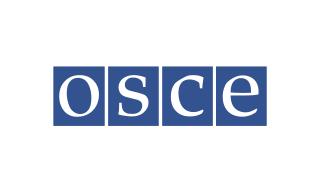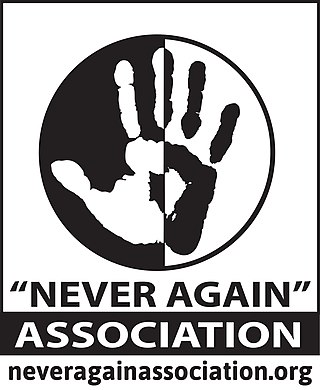A hate crime is crime where a perpetrator targets a victim because of their physical appearance or perceived membership of a certain social group.

The Organization for Security and Co-operation in Europe (OSCE) is a regional security-oriented intergovernmental organization comprising member states in Europe, North America, and Asia. Its mandate includes issues such as arms control, the promotion of human rights, freedom of the press, and free and fair elections. It employs around 3,460 people, mostly in its field operations but also in its secretariat in Vienna, Austria, and its institutions. It has observer status at the United Nations.

Xenophobia is the fear or dislike of anything which is perceived as being foreign or strange. It is an expression which is based on the perception that a conflict exists between an in-group and an out-group and it may manifest itself in suspicion of one group's activities by members of the other group, a desire to eliminate the presence of the group which is the target of suspicion, and fear of losing a national, ethnic, or racial identity.

UNITED for Intercultural Action is a European network against nationalism, racism, fascism and in support of migrants and refugees, in which over 560 organisations from 48 European countries cooperate. UNITED was founded in 1992 and provides a forum for active solidarity and cooperation between a wide variety of organisations in Europe and their activists across European borders.

The European Union Agency for Fundamental Rights, usually known in English as the Fundamental Rights Agency (FRA), is a Vienna-based agency of the European Union inaugurated on 1 March 2007. It was established by Council Regulation (EC) No 168/2007 of 15 February 2007.
The SOVA Center for Information and Analysis is a Moscow-based nongovernmental organization and think tank conducting sociological research primarily on nationalism and racism in post-Soviet Russia. Currently, SOVA devotes its monitoring, research and advocacy to three projects: Misuse of Anti-Extremism Legislation, Racism and Xenophobia, and Religion in Secular Society. SOVA publishes print reports in Russian and maintains a website updating readers in both Russian and English. Its reports are often cited by Western media sources including The New York Times and The Guardian.
Racism has been a recurring part of the history of Europe.

Ukraine is a multi-ethnic country that was formerly part of the Soviet Union. Valeriy Govgalenko argues that racism and ethnic discrimination has arguably been a largely fringe issue in the past, but has had a climb in social influence due to ultra-nationalist parties gaining attention in recent years. There have been recorded incidents of violence where the victim's race is widely thought to have played a role, these incidents receive extensive media coverage and are usually condemned by all mainstream political forces. Human Rights Watch reported that "racism and xenophobia remain entrenched problems in Ukraine". In 2012 the European Commission against Racism and Intolerance (ECRI) reported that "tolerance towards Jews, Russians and Romani appears to have significantly declined in Ukraine since 2000 and prejudices are also reflected in daily life against other groups, who experience problems in accessing goods and services". From 2006 to 2008, 184 attacks and 12 racially motivated murders took place. In 2009, no such murders were recorded, but 40 racial incidents of violence were reported. It is worth considering that, according to Alexander Feldman, president of the Association of National and Cultural Unions of Ukraine, "People attacked on racial grounds do not report the incidents to the police and police often fail to classify such attacks as racially motivated and often write them off as domestic offence or hooliganism".
Antisemitism in Canada is the manifestation of hostility, prejudice or discrimination against the Canadian Jewish people or Judaism as a religious, ethnic or racial group. This form of racism has affected Jews since Canada's Jewish community was established in the 18th century.

The International Holocaust Remembrance Alliance (IHRA), until January 2013 known as the Task Force for International Cooperation on Holocaust Education, Remembrance, and Research or ITF, is an intergovernmental organization founded in 1998 which unites governments and experts to strengthen, advance and promote Holocaust education, research and remembrance worldwide and to uphold the commitments of the Declaration of the Stockholm International Forum on the Holocaust. The IHRA has 34 member countries, one liaison country and seven observer countries.
The United Nations Global Initiative to Fight Human Trafficking (UN.GIFT) is a multi-stakeholder initiative providing global access to expertise, knowledge and innovative partnerships to combat human trafficking.
Racism in Poland has been a subject of extensive study. Ethnic minorities made up a greater proportion of the country's population in the past, right from the founding of the Polish state through the Second Polish Republic, than they did after World War II when government statistics showed that 94% or more of the population self-reported as ethnically Polish.
The Ottawa Protocol on Combating Antisemitism is an action plan which "note and reaffirm the London Declaration on Combating Antisemitism as a template document for the fight against Antisemitism". It was developed during the second annual Conference and Summit of the Inter-parliamentary Coalition for Combating Antisemitism (ICCA) which took place in Ottawa in November, 2010, by Parliamentarians and experts from over 50 countries around the globe. It endorsed the Working Definition of Antisemitism.
The London Declaration on Combating Antisemitism is a declaration which asserts the need for global cooperation in the fight against Antisemitism by drawing "The Democratic world’s attention to the resurgence of Antisemitism as a potent force in politics, international affairs and society". It was signed on February 17, 2009, in Lancaster House, during the Conference and Summit of the Inter-parliamentary Coalition for Combating Antisemitism, by some of the world's leading parliamentarians.

Maria Grazia Giammarinaro is an Italian judge and policy-maker.

Siavosh Derakhti is a Swedish social activist, founder of Young People Against Anti-Semitism and Xenophobia. In 2016, Derakhti was named by Forbes magazine to its list of 30 influential leaders under the age of 30. In recognition of his activism to reduce prejudice and xenophobia, the government of Sweden presented him in 2013 with the Raoul Wallenberg Award, an honor named after the Swedish diplomat who saved thousands of Jews from Nazi death camps during WWII. The selection committee said Derakhti set a "positive example" in his hometown of Malmö and throughout Sweden. "He is a role model for others," the Wallenberg Award committee wrote, "showing through his actions and determination that one person can make a difference." On Nov. 8, 2012, the Swedish Committee Against Antisemitism gave Derakhti its first Elsa Award, established by Committee member Henrik Frenkel in memory of his parents to encourage young people to incorporate social media into the battle against Swedish antisemitism.

Online Hate Prevention Institute (OHPI) is an independent harm prevention charity established in 2012 and based in Australia.
The working definition of antisemitism, also called the International Holocaust Remembrance Alliance definition of antisemitism or IHRA definition, is a non-legally binding statement on what antisemitism is, that reads: "Antisemitism is a certain perception of Jews, which may be expressed as hatred toward Jews. Rhetorical and physical manifestations of antisemitism are directed toward Jewish or non-Jewish individuals and/or their property, toward Jewish community institutions and religious facilities." Accompanying the working definition, but of disputed status, are 11 illustrative examples whose purpose is described as guiding the IHRA in its work, seven of which relate to criticism of the Israeli government. As such, pro-Israeli organizations have been advocates for the worldwide legal adoption of the definition.

Israeli Students combating antisemitism (ISCA) online has been founded in 2011 and operates with the purpose of fighting the growing antisemitism, xenophobia and Holocaust denial on the internet.

"Never Again" Association is Poland's leading anti-racist organization, based in Warsaw. The organization has its roots in an informal anti-Nazi youth group that was active since 1992. It was formally founded in 1996 by Marcin Kornak, a social activist, public life commentator as well as a poet and songwriter who collaborated with independent rock bands. From the age of fifteen, due to an accident, Marcin Kornak lived with a physical disability.














